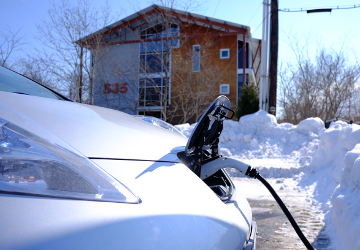Leasing Versus Purchasing an Electric Car

Thinking about a new electric car, but not sure where to begin? After considering what type of electric vehicle makes sense for your needs, we’d suggest deciding whether you want to purchase or lease your new plug-in vehicle.
Leasing cars is more popular than ever - currently about 30% of new vehicles are leased. Plug-in vehicle leasing has some special advantages, including:
- Federal Tax Credit Pass-Through – the federal income tax credits for plug-in vehicle purchases can be rolled into the lease arrangement, greatly simplifying the ability of consumers and businesses to benefit from this program. Due to a quirk in the IRS regulations, many EVs manufactured outside North America the do not qualify for a federal tax credit on an individual purchase can get a credit when leased through a commerical financing company. However, not every leasing company may offer to pass through the federal tax credit on an EV - if they don't then the lessee (driver) is not eligible to claim a tax credit for themselves since the leasing company technically "owns" the vehicle and is the only entity eligible to claim a federal tax credit.
- State and Utility Incentives - Leases may also qualify for State of Vermont and electric utility EV incentives. Typically the lease term must be at least 2 years and additional eligiblity requirements on income and vehicle price may apply. Check our incentive calculator for more information on what you may qualify for. Some participating dealers can pass through these incentives at the point of sale, further reducing a lease downpayment and/or monthly costs.
- Depreciation – The plug-in vehicle market is rapidly developing as more models come to market, battery range increases, and other improvements are made to the vehicles. Leasing allows drivers to try out an EV for their household for a few years without the risk of higher depreciation than expected as technology evolves.
- Maintenance – Leasing a vehicle for 2-4 years means that in most cases any major maintenance issues would be covered under manufacturer warranties.
These are great benefits and have persuaded many electric car purchasers to lease their vehicles. On the other hand, there are some drawbacks: you may end up paying more out of pocket for a lease than purchasing and owning a new car for many years. Also, if you travel well over 12,000 miles a year you may be better off purchasing than paying additional mileage fees. Leasing typically sets an annual cap on miles of 10,000-15,000 miles depending on the lease. Also, the leased vehicle needs to be returned in good condition at the end of the term, so if you have kids or pets then you’ll want to keep this in mind – we recommend seat protectors to keep the interior in good shape! Getting out of a lease contract before the end of the term can be difficult, so if you are contemplating a move or other life changes which could necessitate using a different vehicle it may not work well for you.
Steps to Leasing your New Plug-in Vehicle
- Vehicle Selection and Lease Terms – decide which vehicle(s) you are interested in and determine what mileage allowance you will need. A lease term of 2-3 years will usually keep the EV covered by comprehensive manufacturer warranties. Check with your insurance company to get a quote on your selected vehicle.
- Special Offers – visit manufacturer, industry and local dealer websites to see if there are any special lease deals on offer. Edmunds.com’s Car Incentives resources are a convenient source for this information, although they may not have every option on offer listed. Some automakers may offer additional specials based on where you work. A few of the leasing resources linked below have information on current deals.
- Dealer Negotiation – contact or visit a dealer to discuss your interest. If you are not taking advantage of a pre-arranged lease deal you should start by negotiating the purchase price, called the “capitalized cost” in leasing. TrueCar, Edmunds, Kelley Blue Book, Consumer Reports and other sources can provide information on dealer invoice costs and what others are paying as a useful starting point. Keep in mind that most industry sources recommend a lower down payment than you may be used to since you may lose this if your vehicle is wrecked and the insurance company is only obligated to reimburse the lease financing company for the loss. The Lease Guide resource linked below has helpful guidance on negotiating vehicle leases.
- Reap the Rewards - Regardless of whether your purchase or lease your new electric car, you should save on fuel costs compared to a gasoline vehicle while enjoying great performance and reduced emissions.
Car Leasing Resources
- Lease Guide - Introduction to Vehicle Leasing and Negotiating a Lease
- Leasehackr - Here’s Every EV that Gets A $7,500 Lease Credit (Updated August 2023)
- Consumer Reports - Why Leasing an Electric Car is a Better Deal
- Consumer Reports - Pros and cons of leasing a car
- KBB.com - Leasing vs. Buying an Electric Car in 2023
- Edmunds.com - Quick Guide to Leasing a New Car
- InsideEVs.com - Best EV Lease and Finance Offers
- Electrek.co - Electric Vehicle Lease Guide
- CarandDriver.com - Leasing an EV Is a Workaround That Could Get You That Tax Credit
- Energy Innovation - Electric Vehicle Leasing Is The Cheapest Option For New Car Buyers
- Wall Street Journal - How to Lease a Car and Get the Best Deal